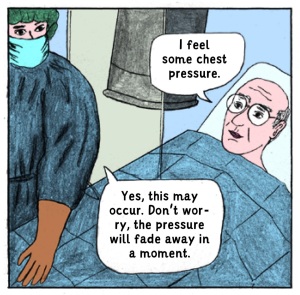by
John R. Fischer, Senior Reporter | April 22, 2019

A new comic-style booklet is helping
patients understand how cardiac
catheterization works more clearly
A group of researchers are replacing capes and superheroes with illustrations of catheters and surgeons in a new "comic-style" booklet designed to walk patients through cardiac catheterization procedures.
The 15 pages of illustrations and simple wording reduce anxiety among patients and enables them to better understand the ins and outs of the operation, according to the authors who work at the German hospital, Charité – Universitätsmedizin Berlin.
"Inspired by the notion that ‘a picture is worth more than a thousand words’, we wanted to use graphical representations to help patients understand the procedural details provided as part of the informed consent procedure," said professor Dr. Verena Stangl, a cardiologist of the medical department, division of cardiology and angiology on Campus Charité Mitte, and a lead investigator of the study. "What our pilot study showed was patients who received this comic-style felt better prepared for surgery.”




Ad Statistics
Times Displayed: 44472
Times Visited: 1374 Keep biomedical devices ready to go, so care teams can be ready to care for patients. GE HealthCare’s ReadySee™ helps overcome frustrations due to lack of network and device visibility, manual troubleshooting, and downtime.
Patients with coronary heart disease have been found to not fully understand the basic procedural steps of cardiac catheterization discussed in standard informed consent procedure, nor when advised on the potential risks and medical benefits of it. This makes their ability to autonomously decide whether to have a specific treatment or not difficult. The book provides verbal and visual interpretations of how cardiac catheterization is performed, and depending on where required, the process for inserting a stent to open narrow or blocked arteries.
The researchers tested their approach using 121 patients scheduled to undergo cardiac catheterization. Participants either underwent the standard informed consent procedure alone, or received it along with the additional comic-style information, with questions posed to each group before and after the informed consent procedure to assess comprehension, anxiety and satisfaction.
Approximately 72 percent of patients were satisfied with the comic-style information booklet and said they were well following the procedure, compared to 41 percent who only underwent standard informed consent. Those who read the booklet also felt less anxious and answered nearly 12 out of 13 questions correctly, on average, about procedural details, risks and postoperative advice, compared to the standard informed consent group, which had a mean score of approximately 9 out of 13 questions right.
"A comic-style presentation enables the simultaneous visual and textual processing of complex information. This has been shown to enhance comprehension in different learner types," said Dr. Anna Brand, the other lead investigator of the study and a cardiologist, in a statement. "The comic-based approach also enables readers to process the information presented at their own speed. "For the first time, our study showed that comic-based medical information can be a highly effective addition to the medical consenting process. We want to use future research to test whether similar positive effects can be achieved in patients undergoing other medical procedures."

